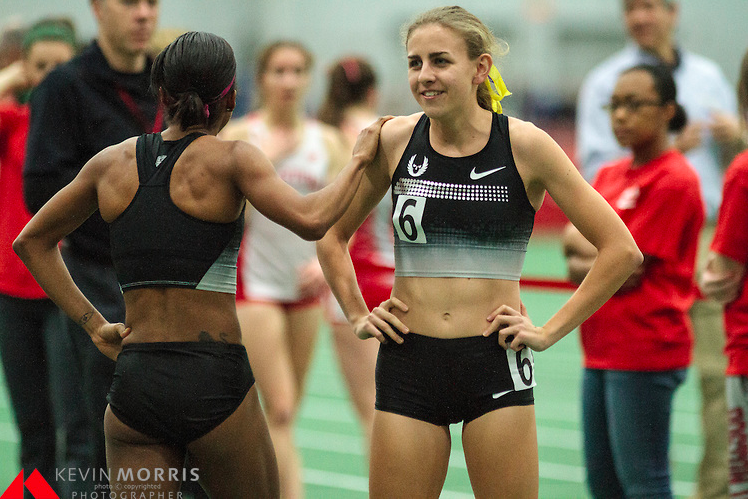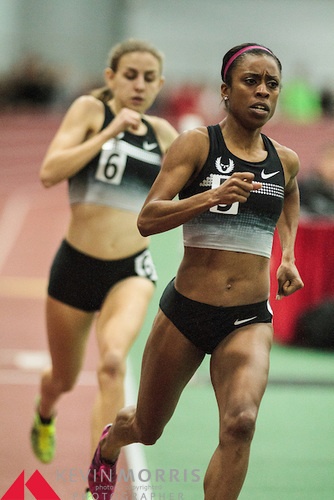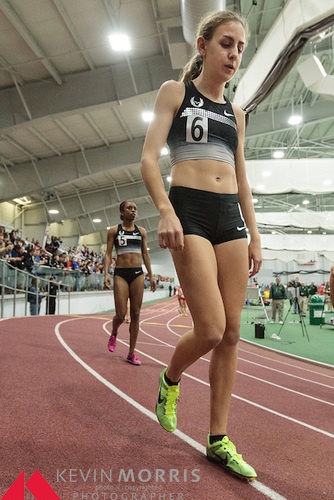BU John Thomas Terrier Invitational 2014Jan 22, 2014 by Mitch Kastoff
Cain, Moser, & Hasay and the women's mile
Cain, Moser, & Hasay and the women's mile

Three Oregon Project women will take a crack at the American indoor mile record this Friday

The three women of the Nike Oregon Project make their way to Boston University to take another shot at an American indoor record. Well, if we want to be specific, it’s two women and one girl. That’s a technicality that’s overlooked every now and then.

The three women of the Nike Oregon Project make their way to Boston University to take another shot at an American indoor record. Well, if we want to be specific, it’s two women and one girl. That’s a technicality that’s overlooked every now and then.
Mile specialists Mary Cain and Treniere Moser, plus one mile prodigy who has found her calling at the 10k, Jordan Hasay, will try and break Mary Slaney’s record of 4:20.5 set all the way back in 1982. The now 5k specialist, who’s still a miler at heart, Shannon Rowbury, is a late scratch.
If you’re looking for this record chase to have a little emotional narrative added to it, look no further. Slaney’s old coach was Alberto Salazar, who--and this part is for those who are totally unaware--is the head coach of the Oregon Project.
Last August, ABC Chicago caught up with Slaney and asked her her thoughts on the potential record chase by her former coach and his athletes. “I would love for it to be someone Alberto is coaching,” Slaney said in regards to her records, which have stood the test of time.
For a little perspective, this is the oldest women’s American indoor record. The next closest is Gwen Torrence’s 55m record of 6.56, which was set in 1987. They don’t really run that anymore so joke’s on you.
Will the record last another year?
Short answer, yes. Last week, we thought that the women’s 1k record was a tall order. We’re under the assumption the mile is even tougher.
#1: All hail the mighty conversion calculator
The equivalent performances for a 4:20.5 mile is 1:57.69 for 800m and 4:00.99 for 1500m. Other than Rowbury’s 1500m personal best of 4:00.33, no one else in the group has ever run under those marks.
If this were maybe, August, and the entire group was at their outdoor peak, then the conversation for the record would be on the table. But since it’s late January and no one has run anything close, the conversion talk is still on the shelves at the supermarket.
#2: The reason the record has stood the test of time is because it’s really, really good
Pop quiz hotshot: how many women have run faster at the indoor mile than Slaney?
Answer: just two.
Below are the top ten indoor mile performances of all-time. It’s a fairly exclusive list.
1 4:17.14 Doina Melinte ROU 27.12.56 1 East Rutherford 09.02.1990 2 4:18.86 Doina Melinte ROU 27.12.56 1 East Rutherford 13.02.1988 3 4:18.99 Paula Ivan ROU 20.07.63 1 East Rutherford 12.02.1989 4 4:20.5 Mary Slaney USA 04.08.58 1 San Diego 19.02.1982 5 4:21.45 Doina Melinte ROU 27.12.56 1 New York City 05.02.1988 6 4:21.47 Mary Slaney USA 04.08.58 1 New York City 12.02.1982 7 4:21.79 Regina Jacobs USA 28.08.63 1 New York City 09.01.2000 8 4:22.01 Mary Slaney USA 04.08.58 1 New York City 25.01.1985 9 4:23.00 Carla Sacramento POR 10.12.71 1 Liévin 24.02.2002 10 4:23.19 Gabriela Szabo ROU 14.11.75 1 Stuttgart 04.02.2001
Just for a point of reference, we did see a woman run an 4:20 mile equivalent on Flotrack last winter.
In mid-February overseas in Birmingham, Genzebe Dibaba ran away from the women’s 1500m field to take an impressive win. The younger “Baby Face Destroyer” would run 4:00.83, which ranks as the 11th fastest indoor 1500m of all-time. Morocco’s Siham Hilali finished second 4:07.99.
#3: They have to go through 800m in 2:09.6 and 1000m in 2:42, which might be tough

Unlike Rupp’s negative split 5000m race, Salazar and company will be looking to run even splits for the women’s mile. The plan, which looks great on paper (when does it not?), will be difficult based on last weekend.
Below are the splits from Cain and Moser’s 1k American record attempt:
200m - 30.46
400m - 1:03.91 (33.45)
600m - 1:36.20 (32.29)
800m - 2:08.38 (32.18)
1000m - 2:39.25 (30.47)
Even if you ignore the second 200m split, the pace still lagged as they needed to run 30.83 per lap to equal the American record of 2:34.19. Say what you want about the rabbiting, but the two didn’t pick it up when Fawn Dorr dropped out and they were more rested because of the slow early pace.
While those two were running the 1k in Boston on Thursday night, the other two Oregon Project women traveled to Washington to run the 800m on Saturday.
The result? Hasay finished 5th in 2:08.85, which is not necessarily the time you’d want to have run going into this attempt. This Friday, she’ll just need to go a little slower through 800m... and then run it again.
And now, because there’s always the chance that someone defies the aforementioned reasoning and pops a big one, here are a few more points for you Oregon Project faithful.
#4: Post-race interviews were positive and post-race workouts were more impressive than the races
The first is a little sports psychology from someone who’s not a doctor (ie: me) and the second is from off-hand knowledge from the reliable Alex Lohr.
If you watched Mary Cain’s post-race interview from Boston, where she thinks she “could have run faster,” you’ll notice that she finds the positives from an unsuccessful attempt. The same could be said for Jordan Hasay’s chat at Washington, where she talks about running 62-second quarters for her post-2:08 workout.
I’m no Freud, but that’s a good mentality to have going into a tough weekend.
While we don’t have the specifics on Hasay and Rowbury’s workout from Washington, we do have some information about the one in Boston.
 Per Alex Lohr, Moser and Cain were slated to run 4x800 and 4x400 after their race. The two split between 2:20 - 2:25 for the 800s and between 60 - 57.5 for the quarters.
Per Alex Lohr, Moser and Cain were slated to run 4x800 and 4x400 after their race. The two split between 2:20 - 2:25 for the 800s and between 60 - 57.5 for the quarters.
If you watched the Workout Wednesday, you’ll hear the coaching staff refer to this as one of Cain’s best pound for pound workouts.
Ed. Note: This was written Wednesday morning, so if there’s no link to the Workout Wednesday, that means it’s still being finished.
#5: "If you don't go after records, you have no chance of breaking records."
The theme of the Oregon Project’s record chase isn’t just a motivational quote we’re posting to garner Facebook and Instagram likes, but is something that the Oregon Project holds true.
Let’s talk about the pace and rabbits. Stephanie Herrick of the Central Park Track Club, who boasts an 800m PR of 2:04.92, will take the first 600m in 1:37 - 1:38. Then Rose-Ann Galligan, who just ran 2:03.69 for 800m in Iceland last week, will try and get the field to 1200m in 3:16. From there, it’s fair game.
Is the group going to make an attempt? Yes. Do I think that the American record will go down? No.
Still, I haven’t said anything about the girl’s world junior 1500m mile record. If you want to see Cain can break Kalkaden Gezahegn’s 4:24.10 mark, hear what the Flotrack brain trust has to say.